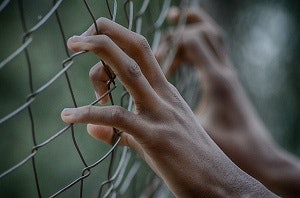Jule Hall was incarcerated at age 17 in 1994. He saw firsthand how the 1994 Crime Bill, which banned Pell Grants for incarcerated students, impacted prison education. Without federal funding, the number of prison higher education programs dwindled. He remembers seeing former students idling in the prison yard, watching television, feeling “a lack of direction in their day-to-day lives.”
“I saw the desolation and despair and the lack of inspiration, frankly, that was left in the wake of removing these academic programs for people in prison,” Hall said.
Now he’s the program officer of post-secondary education in prison at Ascendium Education Solutions. He ultimately completed his bachelor’s degree in German studies with the Bard Prison Initiative, captured in the documentary series “College Behind Bars.”
And with the restoration of the Pell Grant to incarcerated students, a measure included in Congress’s December stimulus package, he hopes students like himself will have more opportunities to learn.
“I truly believe that education is transformative in any setting but in particular in the prison setting,” he said.
Hall shared his story in a Zoom panel on Wednesday, hosted by Prison Fellowship, a Christian nonprofit that works with inmates and their families and advocates for criminal justice reform. Panelists discussed the impact of ending the ban on Pell Grants for incarcerated students.
“Our prisons can be bootcamps of criminality, which they become just left to their own devices, or they can be centers of restoration,” said James Ackerman, president and CEO of Prison Fellowship. “This is why we at Prison Fellowship have advocated for over two decades for the restoration of Pell Grants for incarcerated men and women.”
In practical terms, Pell Grant restoration for incarcerated students might not actually roll out until its implementation deadline on July 1, 2023, said Scott Stump, assistant secretary for career, technical, and adult education for the U.S. Department of Education. With guidance from the federal student aid office, state departments of correction and other entities that oversee these facilities, like the Bureau of Prisons, will need to review and approve education programs, and that “will take a little bit of time.” But the education secretary does have the option to select an earlier start date, he added.
Speakers emphasized that the restoration of the Pell Grant has enjoyed rare bipartisan support. In 2015, the education department under former President Barack Obama piloted the Second Chance Pell program, which allowed 12,000 incarcerated students to participate in prison education. U.S. Secretary of Education Betsy DeVos, who resigned last week, continued and ultimately doubled the program.
Allison Dembeck, vice president of education and labor advocacy for the U.S. Chamber of Commerce, admired bipartisanship around the issue when the chamber announced its Equality of Opportunity Initiative in June, which included support for the Restoring Education and Learning (REAL) Act, the original standalone bill aimed at Pell Grant restoration.
“It’s the perfect example of how bipartisanship can be effective,” said Dembeck. “It’s not just that it was the business community and the criminal justice community. We had far-right groups, far-left groups. We had everyone coming together across the political spectrum. It really was a group of strange bedfellows that really, really did make a difference.”
The law enforcement community was a “little bit late to the game” but also ultimately came out in support of ending the ban on Pell Grants for incarcerated students, said Frank Russo, the director of government and legislative affairs with the National District Attorneys Association. Because research shows prison education reduces recidivism, he sees Pell Grant restoration as a “public safety issue.”
“Restoring Pell Grants and increasing educational opportunities in prisons is an effective tool in providing prisoners with a second chance and breaking that cycle of crime we’ve struggled with for years and years,” Russo added. “It’s crucial you hear that not just from our partners in the business community and the academic community but from the law enforcement community themselves – from prosecutors, from police, from sheriffs – that we also want to be a part of the solution.”
Higher education in prisons isn’t just important for people preparing for the job market upon release. It’s also meaningful for incarcerated people serving lifetime sentences, who play an outsized role in setting the culture within prisons, Hall noted. If lifers are participating in prison education programs, in his experience, others will follow.
“A lot of incarcerated students are full of despair because they’re constantly bombarded with the idea that they’re inmates and they don’t have any future,” Hall said. “By Pell being reinstated, there’s a policy-level narrative change that’s happening here that says, ‘We will support you in your endeavors in trying to transform yourself.’ And I think that is very impactful for people inside trying to find a way to do something constructive with their lives.”
Sara Weissman can be reached at sweissman@diverseeducation.com.















